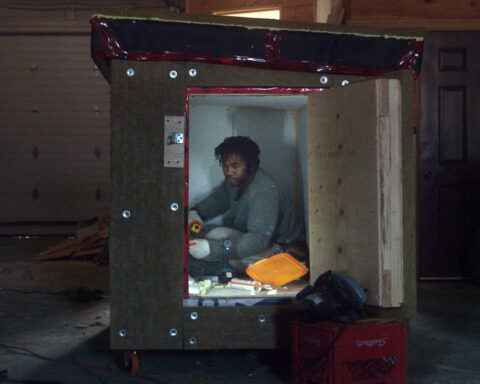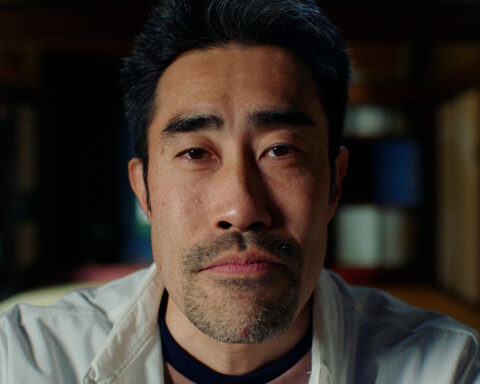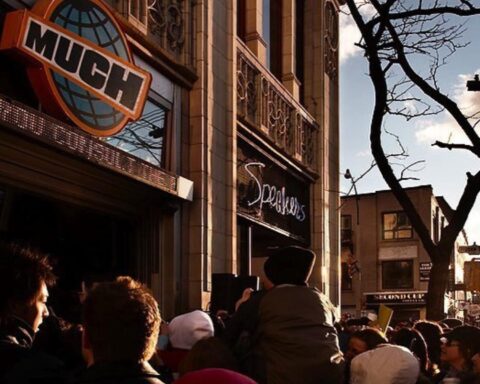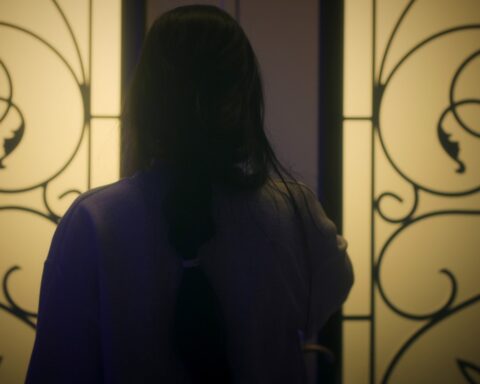Day one
TIFF’s 2012 loot bag included a bag of microwave popcorn, a tin of mints, a bottle of pop and a condom. Nice. Which order to use them in, I wondered? My goal this year was to see as many films as possible, but also to reach the finish line without burning out.
Heading straight to the press conference room, I’m stopped in my tracks to see, for the second year in a row, a documentary film on the front page of Variety. This time it’s the Snoop Lion (Dogg) film, Reincarnated. It chronicles a month-long spiritual journey to Jamaica where Snoop Dogg ‘discovers’ that he’s Bob Marley reincarnated.
The first film I see is Dror Moreh’s The Gatekeepers. My fascination with Israeli cinema is only fuelled by this compelling series of interviews with former heads of the security agency Shin Bet. The struggle to assert control and protection of a nation is characterized by the statement that it’s “possible to win every battle but lose the war.” Change of heart is a central theme in The Gatekeepers. All six former heads of Shin Bet conceded that every advancement in fighting their battles only strengthened the enemy’s resolve. The openness of Israeli cinema to consistently dealing with the big questions is to be commended. One of the more poignant statements from the film is “[V]ictory is finding a better political system.”
Next stop is the festival’s viewing library, where I watch Mahdi Fleifel’s A World Not Ours. It’s a personal story about the filmmaker, who lives in Europe and has free access in and out of Palestinian refugee camp Ain El Helweh, a privilege not available to his extended family, who are stuck in a virtual prison.
Helweh’s friend Abu Iyad, idle because work is illegal, exists through a stipend from Fateh and mostly uses it to buy hash. Stagnating, he finally decides to make a change. With a finger to Fateh, Iyad sacrifices everything and, against all advice, does the unthinkable. Of all the films at TIFF this year, A World Not Ours is the most powerful illustration of a struggle for autonomy. It is also the saddest.
Day two
I kick things off with Far Out Isn’t Far Enough: The Tomi Ungerer Story (dir. Brad Bernstein).
The film, about the career arc of a blacklisted children’s author and illustrator, didn’t exactly grab me from the program, but that’s why having allies helps. TIFF documentary publicist Kelly Meehan frequently steers me towards films she knows are up my alley. As usual, with Far Out, she is on the money.
Embracing his newfound freedom in New York City after having grown up in the Alsace region during World War II, Ungerer was a very successful writer and artist until it was discovered in the late ’60s that he’d also been creating psychedelic adult erotica. Robbed of further opportunities in the children’s genre, Ungerer chose self-exile and eventually landed in Ireland.
Ungerer was a big influence on Maurice Sendak (Where the Wild Things Are), who says of his old compatriot, “The erotica, the beautiful sumptuousness, albums of naked people being tortured. Ha ha ha! Who could not love it?”
For over 25 years, Ungerer lived in obscurity before staging an incredible comeback. Far Out illustrates the life of a man who paid a steep price for his part in the sexual revolution and is a testament to the power of standing up to express what’s real and true. And of bad timing: Ungerer is still prone to making politically incorrect statements.
“Only difference is, now the rest of society is a little more tolerant. Children should be traumatized…if you want to give them a personality.” — Tomi Ungerer
Next up I watch The Girl From the South (dir. José Luis García). Shortly before the Berlin Wall came down, García participated in an international festival for communist youth in Pyongyang, North Korea. At that time he met Lim Su-kyung, a young South Korean activist who was advocating for unification. Wanting to travel from North to South Korea by foot, instead of going around the world as anyone else would, Lim risked her life by crossing the heavily guarded Panmunjom zone. She was immediately accused of being a spy and jailed for several years in South Korea.
García spent the next 20 years building a career as a filmmaker and cinematographer. Lim continued working in the media as a radio personality, suffered the accidental loss of a son, and taught university courses. Mostly she avoided any discussion of her high-profile past.
García eventually contacted her by email and was pleased at how easily he obtained consent to resume filming. Lim was surprised that he still had any interest in her at all and obliged formally, but had reservations. The awkwardness of the filmmaker/subject relationship plays large in the dynamics of the balance of the film and peaks during an interview where they negotiate which language to speak in. Finally, after deciding on English and cutting out the interpreter, it seems that there really is nothing left to discuss. The film could very easily have ended there, as Lim indicated, except that later García received a visit from her in his native Argentina, where Lim wrapped up a loose end around her son’s death.
Day three
I arrive at the West of Memphis (dir. Amy Berg) public screening to a full media circus. Johnny Depp is there in support of the West Memphis Three. Most people, it seems, are there to see Depp. I manage to snag a front-row seat and make the right guess. Out of the five seats strewn across the width of the stage, Depp sits right in front of me. This film, in my opinion, is the best constructed yet on the subject of the three wrongfully convicted teenagers who spent 17 years in jail. Of course, director Amy Berg had the benefit of telling the whole story in hindsight (as opposed to Berlinger and Sinofsky, who made a trilogy by following the story as it played out) and the support of executive producers Peter Jackson and Fran Walsh. But she made the story cinematic while telling a powerful tale.
It was sad indeed to hear Damien Echols, who spent 10 years on death row before being freed recently, note that as part of the conditions of his release, he gave up the right to pursue a civil case. Having spent the entirety of his adult life in incarceration, Echols was left with no real professional skills. Based on other wrongful-conviction precedents, it is estimated that he ought to have been entitled to a settlement of $26 million. Depp respectfully acknowledged the fans who wanted a moment of his attention, but his real reason for being there was displayed by the makeup tattoos he wore on his hands, in imitation of Echols’ real ones.
Day four
Rushing to see American Masters: Inventing David Geffen (dir., Susan Lacy), I whiz by Ken Burns, standing alone in the Lightbox foyer. Fixated on getting to the film, I neglect to stop and request an interview. Ironic. I laugh to myself. I do hate missed opportunities.
In the film, David Geffen, pop-culture mogul that he is, didn’t seem at home with himself until he’d banked his first billion. Reflecting on how monumental that burden must have been, I recall that all I wanted was to be a part of this community. My moment was much more basic: an introduction to the Documentary Organization of Canada’s listserv.
Meeting Susan Lacy, creator of the PBS American Masters series, was intriguing. Twenty-six years earlier, she’d capitalized on her fine arts and cultural studies education to seize on an opportunity to chronicle American icons. At first, broadcaster feedback was fickle. The assumption was that it would be too esoteric and thus, no audience. Several Emmy wins and a dizzying array of subjects later, Lacy is proud of her accomplishment and the network shows every sign of perpetuating the series, as well as growing audiences by sharing existing episodes online.
Showing Geffen amongst those with whom he mingled (John Lennon, Neil Young, Joni Mitchell), those who came before him (John Hammond, Billie Holiday) and those who influenced popular culture in other ways (Warhol, O’Keefe, Capa, Bernstein), Inventing David Geffen is an eye-opener of a film, illustrating the vast influence one man has had on our cultural landscape.
Day five
First up is The Central Park Five, about a group of wrongfully convicted teenagers who were set up by the NYC police to take the fall for the rape and near death of a Central Park jogger in 1989. Ken Burns, his colleague and now son-in-law David McMahon, and his daughter Sarah Burns share directing credits, but it was Sarah who took centre stage at the Q&A. The film, expertly crafted, is cut to the beat of very hip music during the stills segments. Ken Burns is careful to participate, but lets his daughter have her moment.
While introducing the film, TIFF main documentary programmer Thom Powers states that documentary is where reportage meets history, because of the length of time often factored into factual cinematic stories. It’s poignant that the older Burns, usually dwelling in historical films further back in time, would participate in this film about more recent events. But that was Sarah’s initiative. Going to school in NYC during the case, she was outraged at the obvious wrongdoing and made it her mission to highlight the end of the story, overlooked by the rest of the media, so obviously complicit in the original injustice.
Day six
Alex Gibney’s Mea Maxima Culpa: Silence in the House of God squarely addresses the issue of sexual abuse cover-ups in the Catholic Church. Perhaps it was only a matter of time until Gibney, with a long history of tackling systemic abuse of power (Taxi to the Dark Side; Enron: The Smartest Guys in the Room) made this specific film.
Showing how three deaf boys were targeted by the priest at their residential school perfectly illustrates the phenomenon of how sexual perpetrators operate. The boys were selected specifically because their parents didn’t use sign language. All messages to the parents had to go through the person abusing them. This is the most accurate filmed representation I’ve ever seen of the truth that Voice is the first casualty of child abuse. Interview sequences with the survivors are masterfully shot. Pictorially, the shallow focus often left on their hands adds to the audio of their vocal expressions, completing an expression of their pain that left me deeply moved.
The video interview with Gibney will be posted online in the near future. After sharing with Gibney that I too am a survivor, he graciously allowed me to use the footage in my own film, which chronicles my first year in formal recovery (shooting until April 2013). I am left feeling very lucky indeed to be amongst such a supportive community of filmmakers.
Day seven
Having been the guest of Indonesian MPs last year while filming in Java, I am very interested in seeing The Act of Killing (dirs. Joshua Oppenheimer, Christine Cynn, Anonymous). Supporting and encouraging death squad leaders to create dramatic reenactments of crimes they committed in the 1960s is perhaps one of the strangest devices ever used in documentary cinema. But it works. The Act of Killing is, without a doubt, the most disturbing film I’ve ever seen. It’s also a testament to the power of the documentary process to transform human lives. This is a film not to be missed.
Day eight
Fight Like Soldiers, Die Like Children (dir., Patrick Reed) is the followup to Shake Hands with the Devil, which dealt with the Rwandan genocide from the personal perspective of Roméo Dallaire. The new film, also produced by White Pine Pictures, is about Senator Dallaire’s mission to end the use of child soldiers. Since Shake Hands is one of my favourite films ever, I jumped at the opportunity to talk with Dallaire. The footage screened is a work in progress and audience feedback is encouraged.
The edited sequences screened include a combination of live-action footage of Dallaire (returning to Africa in the fight against the use of child soldiers) and animation, narrated by former Congolese child soldier Michel Chikwanine. Dallaire courageously continues to share his own traumatic experiences, past and present, to make the point: using children to wage adult wars is simply wrong and ought not to be an option for anyone, anywhere.
Day nine
Fidai (dir., Damien Ounouri) chronicles the story of the filmmaker’s Algerian uncle, who fought French oppression on his home turf and was imprisoned and tortured for it. There is masterful visual storytelling in this evocative film. In one scene, at the exact moment the sun goes down behind the uncle, he reclaims long-forgotten memories. It’s possible but extremely unlikely that this intersection of graphic visual representation and unfolding of plot was staged. A story of fate, resistance, and the costs of upholding principle, Fidai is a film about politics, personal responsibility and the struggles faced by true activists.
Day ten
Tempting as it is to sleep in, I decide to squeeze one last screening in, Camp 14: Total Control Zone (dir., Marc Wiese). Turns out I’m not the only one who felt that way. One of the larger rooms at the Scotiabank Theatre is nearly full, a wonderful testament to the audience thirst for serious documentaries. The film is a harrowing tale about a man born in a North Korean death camp.
Fortunately I am able to arrange a spontaneous interview immediately afterwards. Some of the people who had attended the screening also manage to find us a half-hour later. Doc makers really are in demand. I wonder how the financing came together, given what I’ve seen of the current funder shyness around serious topics. Wiese says that it all came together quickly and in a relatively simple manner—the exception, in his experience. He shares his belief that the current vapid broadcast environment will eventually shift back to a more fulfilling centre point for socially minded doc makers. I am heartened by his optimism and bolstered by the audience response.
Later that day I arrive home, not exhausted for the first time in TIFF memory. I have reached the finish line with something still in the tank.











